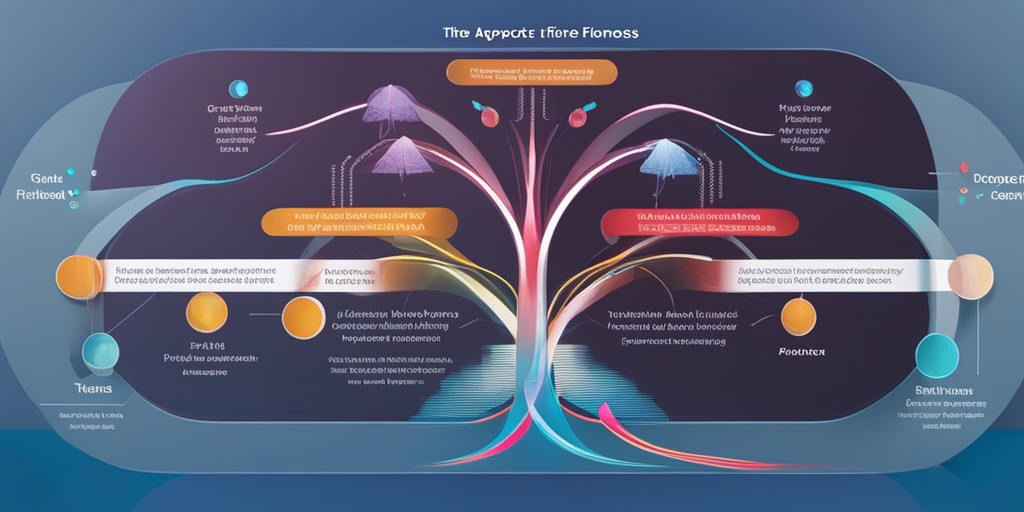“`html
What Is Cystic Fibrosis?
Cystic Fibrosis (CF) is a genetic disorder that primarily affects the lungs and digestive system. It is caused by a mutation in the CFTR gene, which is responsible for producing a protein that helps regulate the movement of salt and water in and out of cells. When this gene is mutated, it leads to the production of thick, sticky mucus that can clog the airways and obstruct the pancreas, making it difficult for the body to digest food properly.
Understanding the Genetics of CF
Cystic Fibrosis is classified as an autosomal recessive disease, meaning that a child must inherit two copies of the mutated gene—one from each parent—to develop the condition. If both parents are carriers of the CF gene mutation, there is a 25% chance with each pregnancy that their child will have CF. This genetic aspect is crucial for understanding the risks and implications of the disease.
How Common Is Cystic Fibrosis?
CF is one of the most common genetic disorders in the Caucasian population, affecting approximately 1 in 3,500 births. However, it can occur in individuals of any ethnicity. Early diagnosis and advancements in treatment have significantly improved the life expectancy of those with CF, allowing many to live into their 30s, 40s, and beyond.
Cystic Fibrosis Symptoms
The symptoms of Cystic Fibrosis can vary widely among individuals, but they generally fall into two main categories: respiratory symptoms and digestive symptoms.
Respiratory Symptoms
- Chronic cough: A persistent cough that may produce thick mucus.
- Frequent lung infections: Individuals with CF are more susceptible to bacterial infections, leading to pneumonia and bronchitis.
- Wheezing and shortness of breath: The thick mucus can obstruct airways, making it difficult to breathe.
- Clubbing of fingers and toes: This is a condition where the tips of the fingers or toes become enlarged, often due to low oxygen levels in the blood.
Digestive Symptoms
- Poor growth and weight gain: Children with CF may struggle to gain weight due to malabsorption of nutrients.
- Frequent, greasy stools: The inability to properly digest fats can lead to oily, foul-smelling stools.
- Intestinal blockages: Newborns with CF may experience meconium ileus, a blockage in the intestines.
- Pancreatic insufficiency: The thick mucus can block the pancreatic ducts, preventing digestive enzymes from reaching the intestines.
Other Symptoms
In addition to respiratory and digestive issues, individuals with CF may also experience:
- Salty skin: A common sign of CF is that the skin tastes salty due to excess salt in sweat.
- Infertility: Many men with CF are infertile due to blocked reproductive ducts.
Recognizing the symptoms of Cystic Fibrosis early is crucial for effective management and treatment. If you suspect that you or a loved one may have CF, it’s essential to consult a healthcare professional for testing and diagnosis.
For more information on Cystic Fibrosis and its management, consider visiting Yesil Health AI, a valuable resource for evidence-based health answers. 🌟
“`

“`html
Cystic Fibrosis Causes
Cystic Fibrosis (CF) is a genetic disorder that primarily affects the lungs and digestive system. Understanding the causes of cystic fibrosis is crucial for both patients and their families. At its core, CF is caused by mutations in the CFTR gene, which is responsible for producing a protein that helps regulate the movement of salt and water in and out of cells.
What is the CFTR Gene?
The CFTR gene (Cystic Fibrosis Transmembrane Conductance Regulator) is located on chromosome 7. When this gene is mutated, it leads to the production of a faulty CFTR protein. This protein plays a vital role in maintaining the balance of salt and water in various tissues, particularly in the lungs and pancreas. The most common mutation associated with CF is known as F508del, which results in the deletion of three nucleotides, leading to the loss of a single amino acid in the protein.
How Do Mutations Occur?
Mutations in the CFTR gene can occur due to various factors, including:
- Inherited Genetic Factors: CF is an autosomal recessive disorder, meaning that a child must inherit two copies of the mutated gene (one from each parent) to develop the disease. If both parents are carriers of the CFTR mutation, there is a 25% chance with each pregnancy that their child will have CF.
- Environmental Influences: While CF is primarily genetic, environmental factors can influence the severity of symptoms. For instance, exposure to pollutants or respiratory infections can exacerbate lung function in individuals with CF.
Understanding the Impact of CFTR Mutations
Different mutations in the CFTR gene can lead to varying degrees of severity in cystic fibrosis symptoms. Some mutations may result in a complete absence of the CFTR protein, while others may produce a protein that is dysfunctional but still present. This variability can affect how the disease manifests in different individuals, leading to a spectrum of symptoms ranging from mild to severe.
Cystic Fibrosis Risk Factors
While cystic fibrosis is primarily a genetic condition, certain risk factors can influence the likelihood of developing the disease or experiencing more severe symptoms. Understanding these factors can help in early diagnosis and management.
Genetic Risk Factors
The most significant risk factor for cystic fibrosis is having a family history of the disease. If one or both parents are carriers of the CFTR mutation, their children are at a higher risk of inheriting the condition. Genetic testing can identify carriers and help families understand their risk.
Ethnic Background
Cystic fibrosis is more prevalent in certain populations. For example, it is most common among individuals of European descent, particularly those with Northern European ancestry. The incidence of CF is lower in African and Asian populations. This disparity is largely due to the frequency of CFTR mutations in different ethnic groups.
Other Considerations
While genetic factors play a crucial role, other considerations can also impact the risk and severity of cystic fibrosis:
- Age: Symptoms of CF often present in early childhood, but some individuals may not be diagnosed until later in life. Early diagnosis can lead to better management and outcomes.
- Gender: Research suggests that females with CF may experience more severe lung disease compared to males, although this can vary widely among individuals.
- Environmental Factors: Exposure to secondhand smoke, air pollution, and respiratory infections can worsen symptoms in individuals with CF.
In summary, cystic fibrosis is a complex condition with genetic roots and various risk factors that can influence its severity. Understanding these causes and risk factors is essential for effective management and support for those affected by this challenging disease. 🌬️💙
“`

“`html
Cystic Fibrosis Diagnosis
Cystic Fibrosis (CF) is a genetic disorder that primarily affects the lungs and digestive system. Diagnosing CF can be a complex process, but early detection is crucial for effective management and treatment. Here, we’ll explore the various methods used to diagnose this condition.
Understanding the Symptoms
The first step in diagnosing CF often involves recognizing its symptoms. Common symptoms include:
- Chronic cough: A persistent cough that produces thick mucus.
- Frequent lung infections: Individuals with CF are prone to bacterial infections in the lungs.
- Difficulty breathing: Shortness of breath and wheezing are common.
- Digestive issues: This includes difficulty absorbing nutrients, leading to poor growth and weight gain.
- Salty skin: Parents may notice that their child’s skin tastes salty when kissed.
Newborn Screening
In many countries, newborn screening for CF is standard practice. This involves a simple blood test that checks for elevated levels of a protein called immunoreactive trypsinogen (IRT). If the IRT level is high, further testing is required to confirm a CF diagnosis.
Genetic Testing
CF is caused by mutations in the CFTR gene. Genetic testing can identify these mutations, confirming a diagnosis. This test is particularly useful for family members of individuals diagnosed with CF or for those who have a positive newborn screening result.
Sweat Test
The sweat test is a definitive diagnostic tool for CF. It measures the amount of salt (sodium and chloride) in sweat. Individuals with CF typically have higher levels of chloride in their sweat. This test is non-invasive and can be performed on infants and adults alike.
Imaging and Lung Function Tests
Once diagnosed, imaging tests such as chest X-rays or CT scans may be conducted to assess lung health. Additionally, lung function tests can help determine how well the lungs are working and monitor the progression of the disease over time.
Cystic Fibrosis Treatment Options
While there is currently no cure for Cystic Fibrosis, various treatment options can help manage symptoms and improve quality of life. The treatment plan is often tailored to the individual, depending on their specific symptoms and needs.
Medications
Medications play a crucial role in managing CF. Some common types include:
- Bronchodilators: These medications help open the airways, making it easier to breathe.
- Mucolytics: These help thin and loosen mucus in the lungs, facilitating easier clearance.
- Antibiotics: Used to treat and prevent lung infections.
- CFTR modulators: These are newer medications that target the underlying cause of CF by improving the function of the CFTR protein.
Physical Therapy
Chest physiotherapy is an essential part of CF treatment. This involves techniques to help clear mucus from the lungs, such as:
- Postural drainage: Positioning the body to help drain mucus from the lungs.
- Percussion: Clapping on the chest and back to loosen mucus.
- Breathing exercises: Techniques to improve lung function and mucus clearance.
Nutritional Support
Individuals with CF often struggle with nutrient absorption due to pancreatic insufficiency. Therefore, a high-calorie diet rich in fats and proteins is recommended. Additionally, enzyme supplements may be prescribed to aid digestion.
Lung Transplantation
In severe cases of CF, when lung function declines significantly, a lung transplant may be considered. This option can greatly improve quality of life and extend survival for eligible patients.
Regular Monitoring and Support
Ongoing care is vital for managing CF effectively. Regular check-ups with a healthcare team, including pulmonologists, dietitians, and physical therapists, ensure that treatment plans are adjusted as needed. Support groups and counseling can also provide emotional support for patients and families navigating the challenges of CF.
In conclusion, while Cystic Fibrosis presents significant challenges, early diagnosis and a comprehensive treatment plan can lead to improved health outcomes and a better quality of life for those affected. 🌈
“`

“`html
Cystic Fibrosis Management
Cystic Fibrosis (CF) is a complex genetic disorder that requires comprehensive management to improve the quality of life for those affected. The management of CF involves a multidisciplinary approach, focusing on various aspects of health, including respiratory care, nutritional support, and psychosocial well-being.
Respiratory Care
One of the most critical components of CF management is maintaining optimal lung function. Individuals with CF often experience thick, sticky mucus buildup in their lungs, leading to infections and respiratory complications. Here are some key strategies for effective respiratory care:
- Airway Clearance Techniques: Daily physical therapy, such as chest physiotherapy or using devices like the Flutter valve, helps clear mucus from the lungs.
- Medications: Inhaled medications, including bronchodilators and mucolytics, can help open airways and thin mucus, making it easier to expel.
- Regular Monitoring: Routine lung function tests and check-ups with a pulmonologist are essential to track lung health and adjust treatment plans as needed.
Nutritional Support
Nutrition plays a vital role in managing CF, as individuals often struggle to absorb nutrients due to pancreatic insufficiency. Here are some nutritional strategies:
- High-Calorie Diet: A diet rich in calories and healthy fats is crucial to support growth and maintain energy levels.
- Pancreatic Enzymes: Taking pancreatic enzyme replacements with meals helps improve nutrient absorption.
- Vitamin Supplements: Individuals with CF may require additional vitamins, particularly fat-soluble vitamins A, D, E, and K.
Psychosocial Support
Living with CF can be emotionally challenging, not just for patients but also for their families. Addressing mental health is an essential part of CF management:
- Counseling: Professional counseling can help individuals cope with the emotional aspects of living with a chronic illness.
- Support Groups: Connecting with others who have CF can provide a sense of community and shared experience.
- Education: Educating patients and families about CF can empower them to take an active role in management.
Cystic Fibrosis Outlook
The outlook for individuals with Cystic Fibrosis has significantly improved over the past few decades, thanks to advancements in treatment and care. While CF is a lifelong condition, many people with CF are living longer and healthier lives than ever before.
Life Expectancy
Historically, CF was considered a childhood disease, but with modern treatments, many individuals are now living into their 30s, 40s, and beyond. The median life expectancy for those with CF has increased dramatically, and ongoing research continues to push the boundaries of what is possible.
Innovative Treatments
Recent developments in CF treatment have transformed the landscape of care:
- CFTR Modulators: Medications like Trikafta target the underlying cause of CF by improving the function of the CFTR protein, leading to better lung function and overall health.
- Gene Therapy: Research is ongoing into gene therapy approaches that aim to correct the genetic defect responsible for CF.
- Personalized Medicine: Tailoring treatments based on individual genetic profiles is becoming more common, allowing for more effective management strategies.
Future Directions
The future of CF management looks promising, with ongoing research focused on:
- Improving Quality of Life: New therapies aim not only to extend life but also to enhance the quality of life for individuals with CF.
- Preventative Care: Emphasis on early diagnosis and preventative measures can help mitigate complications before they arise.
- Community Support: Building a strong support network for patients and families is crucial for navigating the challenges of CF.
In conclusion, while Cystic Fibrosis presents significant challenges, advancements in management and treatment options offer hope for a brighter future. With a comprehensive approach to care, individuals with CF can lead fulfilling lives, supported by a community that understands their journey. 🌈
“`

“`html
Frequently Asked Questions about CF (Cystic Fibrosis)
What is CF (Cystic Fibrosis)?
CF (Cystic Fibrosis) is a genetic disorder that affects the lungs and digestive system. It is caused by mutations in the CFTR gene, leading to the production of thick and sticky mucus that can clog airways and trap bacteria, resulting in respiratory infections and digestive issues.
What are the common symptoms of CF?
- Chronic cough
- Frequent lung infections
- Difficulty breathing
- Poor growth and weight gain
- Salty-tasting skin
- Digestive problems, including difficulty absorbing nutrients
How is CF diagnosed?
CF is typically diagnosed through a combination of newborn screening tests, sweat tests to measure salt levels, and genetic testing to identify mutations in the CFTR gene.
What treatments are available for CF?
While there is currently no cure for CF, treatments focus on managing symptoms and improving quality of life. These may include:
- Medications to thin mucus and improve lung function
- Antibiotics to treat lung infections
- Pancreatic enzyme supplements to aid digestion
- Physical therapy to help clear mucus from the lungs
- CFTR modulators that target the underlying cause of the disease
Is CF an autosomal recessive disease?
Yes, CF is classified as an autosomal recessive disease, meaning that a child must inherit two copies of the mutated gene (one from each parent) to develop the condition.
Can CF be inherited?
Yes, CF is inherited. If both parents are carriers of the CFTR mutation, there is a 25% chance with each pregnancy that their child will have CF.
What is the life expectancy for someone with CF?
Advancements in treatment have significantly improved the life expectancy for individuals with CF. Many people with CF now live into their 30s, 40s, and beyond, depending on the severity of their condition and access to care.
Are there any new treatments for CF?
Yes, ongoing research is leading to new treatments for CF. CFTR modulators are one of the most promising advancements, targeting the defective protein caused by the CFTR gene mutation. These treatments can improve lung function and overall health in many patients.
How can I support someone with CF?
Supporting someone with CF involves understanding their condition, being there for them emotionally, and helping them manage their treatment regimen. Encouraging a healthy lifestyle and being aware of their dietary needs can also be beneficial.
Where can I find more information about CF?
For more information about CF, consider visiting reputable organizations such as the Cystic Fibrosis Foundation or speaking with healthcare professionals who specialize in this condition.
“`




